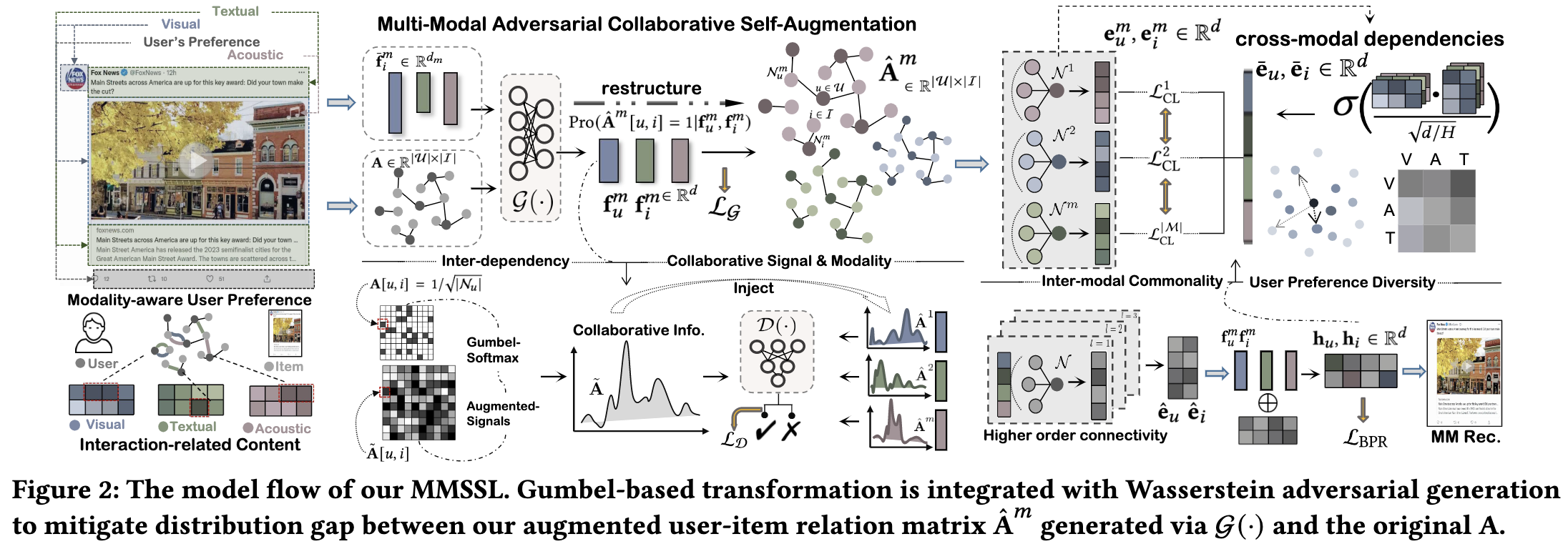PyTorch implementation for WWW 2023 paper Multi-Modal Self-Supervised Learning for Recommendation.
MMSSL is a new multimedia recommender system MMSSL which integrates the generative modality-aware collaborative self-augmentation and the contrastive cross-modality dependency encoding. It achieves better performance than existing SOTA multi-model recommenders.
- Python >= 3.9.13
- Pytorch >= 1.13.0+cu116
- dgl-cuda11.6 >= 0.9.1post1
Start training and inference as:
cd MMSSL
python main.py --dataset {DATASET}
Supported datasets: Amazon-Baby, Amazon-Sports, Tiktok, Allrecipes
├─ MMSSL/
├── data/
├── tiktok/
...
| Dataset | Amazon | Tiktok | Allrecipes | ||||||||||
|---|---|---|---|---|---|---|---|---|---|---|---|---|---|
| Modality | V | T | V | T | V | A | T | V | T | ||||
| Embed Dim | 4096 | 1024 | 4096 | 1024 | 128 | 128 | 768 | 2048 | 20 | ||||
| User | 35598 | 19445 | 9319 | 19805 | |||||||||
| Item | 18357 | 7050 | 6710 | 10067 | |||||||||
| Interactions | 256308 | 139110 | 59541 | 58922 | |||||||||
| Sparsity | 99.961% | 99.899% | 99.904% | 99.970% |
2023.3.23 update(all datasets uploaded): We provide the processed data at Google Drive.2023.3.24 update: The official website of theTiktokdataset has been closed. Thus, we also provide many other versions of preprocessed Tiktok. We spent a lot of time pre-processing this dataset, so if you want to use our preprocessed Tiktok in your work please cite.
# part of data preprocessing
# #----json2mat--------------------------------------------------------------------------------------------------
import json
from scipy.sparse import csr_matrix
import pickle
import numpy as np
n_user, n_item = 39387, 23033
f = open('/home/weiw/Code/MM/MMSSL/data/clothing/train.json', 'r')
train = json.load(f)
row, col = [], []
for index, value in enumerate(train.keys()):
for i in range(len(train[value])):
row.append(int(value))
col.append(train[value][i])
data = np.ones(len(row))
train_mat = csr_matrix((data, (row, col)), shape=(n_user, n_item))
pickle.dump(train_mat, open('./train_mat', 'wb'))
# # ----json2mat--------------------------------------------------------------------------------------------------
# ----mat2json--------------------------------------------------------------------------------------------------
# train_mat = pickle.load(open('./train_mat', 'rb'))
test_mat = pickle.load(open('./test_mat', 'rb'))
# val_mat = pickle.load(open('./val_mat', 'rb'))
# total_mat = train_mat + test_mat + val_mat
total_mat =test_mat
# total_mat = pickle.load(open('./new_mat','rb'))
# total_mat = pickle.load(open('./new_mat','rb'))
total_array = total_mat.toarray()
total_dict = {}
for i in range(total_array.shape[0]):
total_dict[str(i)] = [index for index, value in enumerate(total_array[i]) if value!=0]
new_total_dict = {}
for i in range(len(total_dict)):
# if len(total_dict[str(i)])>1:
new_total_dict[str(i)]=total_dict[str(i)]
# train_dict, test_dict = {}, {}
# for i in range(len(new_total_dict)):
# train_dict[str(i)] = total_dict[str(i)][:-1]
# test_dict[str(i)] = [total_dict[str(i)][-1]]
# train_json_str = json.dumps(train_dict)
test_json_str = json.dumps(new_total_dict)
# with open('./new_train.json', 'w') as json_file:
# # with open('./new_train_json', 'w') as json_file:
# json_file.write(train_json_str)
with open('./test.json', 'w') as test_file:
# with open('./new_test_json', 'w') as test_file:
test_file.write(test_json_str)
# ----mat2json--------------------------------------------------------------------------------------------------
Performance comparison of baselines on different datasets in terms of Recall@20, Precision@20 and NDCG@20:
| Baseline | Tiktok | Amazon-Baby | Amazon-Sports | Allrecipes | |||||||||||
|---|---|---|---|---|---|---|---|---|---|---|---|---|---|---|---|
| R@20 | P@20 | N@20 | R@20 | P@20 | N@20 | R@20 | P@20 | N@20 | R@20 | P@20 | N@20 | ||||
| MF-BPR | 0.0346 | 0.0017 | 0.0130 | 0.0440 | 0.0024 | 0.0200 | 0.0430 | 0.0023 | 0.0202 | 0.0137 | 0.0007 | 0.0053 | |||
| NGCF | 0.0604 | 0.0030 | 0.0238 | 0.0591 | 0.0032 | 0.0261 | 0.0695 | 0.0037 | 0.0318 | 0.0165 | 0.0008 | 0.0059 | |||
| LightGCN | 0.0653 | 0.0033 | 0.0282 | 0.0698 | 0.0037 | 0.0319 | 0.0782 | 0.0042 | 0.0369 | 0.0212 | 0.0010 | 0.0076 | |||
| SGL | 0.0603 | 0.0030 | 0.0238 | 0.0678 | 0.0036 | 0.0296 | 0.0779 | 0.0041 | 0.0361 | 0.0191 | 0.0010 | 0.0069 | |||
| NCL | 0.0658 | 0.0034 | 0.0269 | 0.0703 | 0.0038 | 0.0311 | 0.0765 | 0.0040 | 0.0349 | 0.0224 | 0.0010 | 0.0077 | |||
| HCCF | 0.0662 | 0.0029 | 0.0267 | 0.0705 | 0.0037 | 0.0308 | 0.0779 | 0.0041 | 0.0361 | 0.0225 | 0.0011 | 0.0082 | |||
| VBPR | 0.0380 | 0.0018 | 0.0134 | 0.0486 | 0.0026 | 0.0213 | 0.0582 | 0.0031 | 0.0265 | 0.0159 | 0.0008 | 0.0056 | |||
| LightGCN-$M$ | 0.0679 | 0.0034 | 0.0273 | 0.0726 | 0.0038 | 0.0329 | 0.0705 | 0.0035 | 0.0324 | 0.0235 | 0.0011 | 0.0081 | |||
| MMGCN | 0.0730 | 0.0036 | 0.0307 | 0.0640 | 0.0032 | 0.0284 | 0.0638 | 0.0034 | 0.0279 | 0.0261 | 0.0013 | 0.0101 | |||
| GRCN | 0.0804 | 0.0036 | 0.0350 | 0.0754 | 0.0040 | 0.0336 | 0.0833 | 0.0044 | 0.0377 | 0.0299 | 0.0015 | 0.0110 | |||
| LATTICE | 0.0843 | 0.0042 | 0.0367 | 0.0829 | 0.0044 | 0.0368 | 0.0915 | 0.0048 | 0.0424 | 0.0268 | 0.0014 | 0.0103 | |||
| CLCRec | 0.0621 | 0.0032 | 0.0264 | 0.0610 | 0.0032 | 0.0284 | 0.0651 | 0.0035 | 0.0301 | 0.0231 | 0.0010 | 0.0093 | |||
| MMGCL | 0.0799 | 0.0037 | 0.0326 | 0.0758 | 0.0041 | 0.0331 | 0.0875 | 0.0046 | 0.0409 | 0.0272 | 0.0014 | 0.0102 | |||
| SLMRec | 0.0845 | 0.0042 | 0.0353 | 0.0765 | 0.0043 | 0.0325 | 0.0829 | 0.0043 | 0.0376 | 0.0317 | 0.0016 | 0.0118 | |||
| MMSSL | 0.0921 | 0.0046 | 0.0392 | 0.0962 | 0.0051 | 0.0422 | 0.0998 | 0.0052 | 0.0470 | 0.0367 | 0.0018 | 0.0135 | |||
| p-value | 1.28e-5 | 7.12e-6 | 6.55e-6 | 2.23e-6 | 7.69e-6 | 8.65e-7 | 7.75e-6 | 6.48e-6 | 6.78e-7 | 3.94e-4 | 5.06e-6 | 4.31e-5 | |||
| Improv. | 8.99% | 9.52% | 6.81% | 16.04% | 15.91% | 14.67% | 9.07% | 8.33% | 10.85% | 15.77% | 12.50% | 14.40% |
If you find this work is helpful to your research, please kindely consider cite our paper:
@article{wei2023multi,
title={Multi-Modal Self-Supervised Learning for Recommendation},
author={Wei, Wei and Huang, Chao and Xia, Lianghao and Zhang, Chuxu},
journal={arXiv preprint arXiv:2302.10632},
year={2023}
}
The structure of this code is largely based on LATTICE. Thank for their work.
